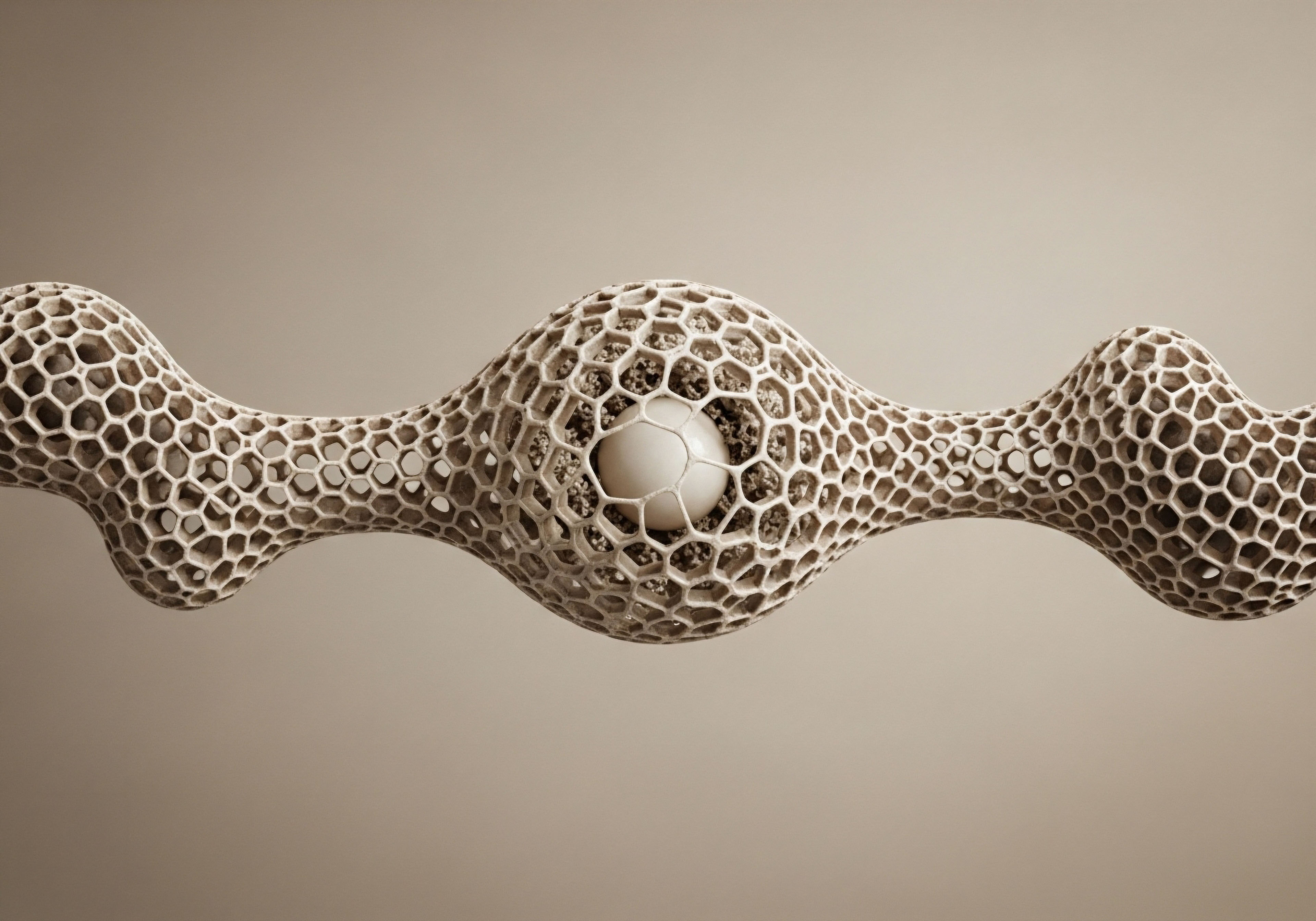

Fundamentals
The conversation around hormonal optimization often centers on vitality, muscle mass, and libido. Your kidneys, the silent regulators of your body’s internal chemistry, are rarely part of this initial discussion. Yet, their intricate relationship with your endocrine system is a foundational element of long-term health.
When we introduce therapeutic hormones, we are initiating a dialogue with a deeply interconnected system, and the kidneys are listening intently. Their role extends far beyond simple filtration; they are sophisticated metabolic organs that respond to and influence hormonal signals.
Understanding this connection begins with appreciating the kidney’s sensitivity to blood flow and pressure, both of which are modulated by hormones like testosterone. The kidneys also play a part in producing hormones themselves, such as erythropoietin, which governs red blood cell production. Introducing external hormonal therapies, therefore, creates a new set of instructions for these vital organs.
The question is not one of simple cause and effect, but of how this new information is integrated into a pre-existing, complex biological network.
The kidneys are active participants in the endocrine system, responding to and influencing hormonal signals that are central to overall metabolic health.
For many individuals, particularly men with clinically low testosterone, initiating therapy is a step toward reclaiming a sense of well-being that has been slowly eroding. The fatigue, cognitive fog, and physical decline associated with hypogonadism are tangible experiences.
The decision to begin a protocol like Testosterone Replacement Therapy (TRT) is often born from a desire to restore function and feel like oneself again. In this context, the long-term health of your kidneys becomes a critical component of a successful and sustainable wellness strategy.

The Kidney’s Role in Hormonal Balance
Your kidneys are not passive filters. They are dynamic organs that actively participate in maintaining the body’s delicate equilibrium, a state known as homeostasis. This includes managing fluid balance, electrolyte levels, and blood pressure. Hormones are the chemical messengers that direct these processes, and the kidneys are equipped with receptors that allow them to respond to these signals with precision. For instance, the renin-angiotensin-aldosterone system, a critical hormonal cascade for blood pressure regulation, originates in the kidneys.
When hormonal optimization therapies are introduced, they can influence these finely tuned mechanisms. Testosterone, for example, can affect sodium and water retention, which in turn impacts blood volume and pressure. It also has a relationship with red blood cell production, a process initiated by a hormone secreted by the kidneys.
Acknowledging these connections is the first step in understanding the long-term implications of hormonal therapies. It reframes the conversation from a narrow focus on a single hormone to a broader appreciation of systemic interplay.

How Do Hormones Directly Affect Renal Tissues?
The cells within the kidneys possess receptors for various hormones, including androgens like testosterone. This means that hormones can exert direct effects on kidney cells, influencing their growth, function, and even their survival.
Research has explored how testosterone can impact the glomeruli, the tiny filtering units within the kidneys, and the renal tubules, which are responsible for reabsorbing essential substances back into the bloodstream. The presence of these receptors suggests a biological basis for the observed changes in renal function during hormonal therapy.
This direct cellular influence is a key area of scientific inquiry. The response of kidney cells to hormonal signals can vary based on dosage, the individual’s underlying health status, and the specific type of hormone therapy being administered.
The goal of a well-designed protocol is to provide these signals in a manner that supports optimal function, rather than creating an environment of cellular stress. This requires a sophisticated understanding of the dose-response relationship and the unique physiology of the individual.


Intermediate
When considering the long-term renal implications of hormonal optimization, we move from foundational concepts to the specific mechanisms of action and the clinical data that informs our protocols. For an individual on a supervised therapy like Testosterone Replacement Therapy (TRT), the focus shifts to how these interventions can be managed to support, and in some cases, even enhance renal function.
This requires a look at the measurable biomarkers of kidney health and how they respond to hormonal inputs over time.
The primary markers of renal function include serum creatinine, urea, uric acid, and the estimated glomerular filtration rate (eGFR). Creatinine is a waste product of muscle metabolism, and its level in the blood is often used as an indicator of how well the kidneys are filtering waste.
However, it is important to recognize that TRT can increase muscle mass, which may lead to a corresponding rise in creatinine levels that reflects muscle growth rather than a decline in kidney function. This highlights the necessity of interpreting lab results within the full clinical context.

Analyzing the Impact of TRT on Renal Biomarkers
Observational studies have provided valuable insights into how long-term TRT affects these key renal markers in men with hypogonadism. A prospective registry study followed a group of men on testosterone undecanoate for up to 12 years and compared them to a control group of hypogonadal men who opted against therapy. The findings from this and similar studies suggest a pattern of improved renal function in the treatment group.
Over the course of the study, the men receiving TRT exhibited statistically significant decreases in serum creatinine, uric acid, and urea. Perhaps most importantly, their estimated glomerular filtration rate (eGFR), a primary measure of kidney function, showed an increase. In contrast, the control group experienced a slight worsening of these markers over the same period. These results point toward a potentially protective or restorative effect of normalizing testosterone levels in men with a diagnosed deficiency.
Long-term studies suggest that medically supervised testosterone therapy in hypogonadal men can lead to improvements in key markers of renal function, including an increase in the glomerular filtration rate.
The mechanisms behind these improvements are likely multifaceted. Normalizing testosterone can lead to better metabolic health, including improvements in body composition, insulin sensitivity, and blood pressure, all of which reduce the overall burden on the kidneys. The reduction in uric acid levels observed in some studies is also significant, as high uric acid is a known risk factor for kidney disease.
The data suggests that the benefits of TRT on the metabolic syndrome may indirectly translate to better long-term renal outcomes.

Understanding the Role of Glomerular Filtration Rate
The glomerular filtration rate (GFR) represents the volume of fluid filtered from the renal glomerular capillaries into Bowman’s capsule per unit of time. It is the gold standard for assessing kidney function. An increase in GFR, as was observed in long-term TRT studies, indicates that the kidneys are becoming more efficient at their primary job of filtering the blood.
One study reported an increase in GFR from 86.6 to 98.5 mL/min/1.73m2 over an 8-year period in men receiving testosterone therapy, while the untreated control group saw a decrease.
This improvement in filtration capacity is a powerful indicator of positive renal adaptation. It suggests that rather than imposing a harmful stress, restoring testosterone to a physiological range in hypogonadal men may enhance the intrinsic functional capacity of the kidneys. This could be due to direct effects on the renal vasculature, such as improved blood flow to the glomeruli, or indirect effects related to the overall improvement in cardiovascular and metabolic health.
| Biomarker | Observed Change in TRT Group (Long-Term Study) | Observed Change in Control Group (No TRT) |
|---|---|---|
| Serum Creatinine | Decrease | Increase |
| Uric Acid | Decrease | Stable or slight increase |
| Urea | Decrease | Stable |
| Glomerular Filtration Rate (GFR) | Increase | Decrease |


Academic
An academic exploration of the long-term renal implications of hormonal optimization therapies necessitates a departure from broad observations and a move toward the nuanced interplay of hemodynamics, cellular biology, and systemic metabolic regulation. The prevailing clinical data, particularly in the context of testosterone replacement in hypogonadal males, points toward a net beneficial effect on renal function.
However, a deeper, mechanistic understanding is required to fully appreciate these outcomes and to inform the responsible, long-term management of these powerful therapies.
The central question evolves from “what happens?” to “how does it happen?”. The answer lies in the confluence of testosterone’s effects on intrarenal hemodynamics, its modulation of the metabolic syndrome, and its direct influence on renal cellular physiology. The kidney is not merely a passive recipient of hormonal influence; it is an active participant in a complex feedback system. Understanding this system is paramount for any clinician or patient engaged in a long-term hormonal optimization strategy.

Intrarenal Hemodynamics and Testosterone
The functional capacity of the kidney is inextricably linked to the volume and pressure of blood flowing through its intricate vascular network. Testosterone has known effects on vascular tone and blood flow. The presence of androgen receptors on the afferent arterioles, the small arteries that supply blood to the glomeruli, provides a direct mechanism for testosterone to influence renal perfusion. The question of whether this influence is beneficial or detrimental has been a subject of investigation.
In one case study involving a pediatric patient, acute exposure to testosterone was associated with a reduction in cortical blood flow and a transient decline in renal function. This highlights the importance of context and dose. However, in the setting of long-term, physiologic replacement in hypogonadal adults, the evidence suggests a different outcome.
The observed improvements in GFR in these populations may be attributable to a normalization of renal hemodynamics. By improving overall cardiovascular health and endothelial function, TRT may lead to more stable and efficient perfusion of the renal cortex, thereby enhancing filtration capacity.
- Afferent Arterioles ∞ These vessels control blood flow into the glomeruli and possess androgen receptors, making them directly responsive to testosterone levels.
- Renal Blood Flow ∞ The volume of blood that passes through the kidneys per unit of time. Testosterone’s influence on systemic blood pressure and vascular health can impact this critical parameter.
- Glomerular Pressure ∞ The hydrostatic pressure within the glomerular capillaries, which is the driving force for filtration. Appropriate hormonal balance helps maintain this pressure within an optimal range.

Metabolic Syndrome as a Confounding Variable
It is nearly impossible to discuss the long-term renal effects of TRT without considering its profound impact on the metabolic syndrome. Hypogonadism is strongly associated with a cluster of conditions including central obesity, insulin resistance, dyslipidemia, and hypertension. This constellation of metabolic dysfunction places a significant and sustained stress on the kidneys, contributing to the progression of chronic kidney disease.
Long-term testosterone therapy has been shown to ameliorate many components of the metabolic syndrome. It can lead to a reduction in visceral fat, an improvement in insulin sensitivity, and better blood pressure control. These systemic improvements reduce the overall burden on the kidneys.
Therefore, a significant portion of the observed renal benefits of TRT may be an indirect consequence of restoring metabolic health. This is a critical distinction, as it reframes TRT not as a direct “kidney treatment,” but as a systemic intervention that yields secondary renal benefits.
The amelioration of the metabolic syndrome through testosterone therapy likely accounts for a significant portion of the observed long-term benefits to renal function.
This systems-biology perspective is essential. The improvement in GFR and the reduction in waste products like urea and uric acid are the downstream effects of a system being brought back into a state of healthier equilibrium.
The reduction in inflammation and oxidative stress that accompanies the reversal of metabolic syndrome also creates a more favorable environment for the long-term health of renal cells. This integrated view allows for a more sophisticated approach to patient care, where the goal is not just to normalize a single hormone, but to restore the harmonious function of interconnected physiological systems.
| Systemic Effect of TRT | Mechanism of Action | Resulting Renal Benefit |
|---|---|---|
| Improved Insulin Sensitivity | Increased glucose uptake in muscle and adipose tissue. | Reduced risk of diabetic nephropathy and glucotoxicity. |
| Reduced Visceral Adiposity | Shifts in body composition, favoring lean mass over fat mass. | Decreased production of inflammatory cytokines that can damage renal tissue. |
| Lowered Blood Pressure | Improvements in endothelial function and vascular tone. | Reduced intraglomerular pressure and hyperfiltration injury. |
| Decreased Uric Acid | Enhanced renal clearance and potentially altered production. | Lowered risk of urate crystal deposition and associated kidney damage. |

References
- Yassin, A. A. et al. “The impact of long-term Testosterone Therapy (TTh) in renal function (RF) among hypogonadal men ∞ An observational cohort study.” Andrology, vol. 8, no. 5, 2020, pp. 1463-1471.
- Yassin, A. et al. “Long-term Testosterone Therapy Improves Renal Function in Men with Hypogonadism.” Journal of Clinical Nephrology and Research, vol. 7, no. 1, 2020, p. 1095.
- Saad, F. et al. “The impact of long-term Testosterone Therapy (TTh) in renal function (RF) among hypogonadal men.” Weight Success Centers, 2020.
- Gurevich, R. “Testosterone Replacement Therapy (TRT) and kidney health ∞ What you should know.” SingleCare, 2024.
- El-Malla, M. et al. “Is Testosterone Detrimental to Renal Function? A Case Report and a Review of the Literature.” Case Reports in Nephrology, vol. 2012, 2012, pp. 1-4.

Reflection
The information presented here offers a clinical framework for understanding the relationship between hormonal optimization and renal health. It translates complex biological processes into a narrative of systemic interplay and long-term function. Your own body is a unique and intricate system, with its own history, sensitivities, and predispositions. The data from large-scale studies provides a valuable map, but it does not replace the need for personalized navigation.
This knowledge is designed to be a tool for empowerment, enabling a more informed and collaborative dialogue with your healthcare provider. The path to sustained wellness is one of continuous learning and adaptation. As you move forward in your health journey, consider how this deeper understanding of your body’s internal communication network can inform your choices and goals.
The ultimate aim is to cultivate a state of vitality that is not only felt, but is also sustainable at a deep physiological level for years to come.



